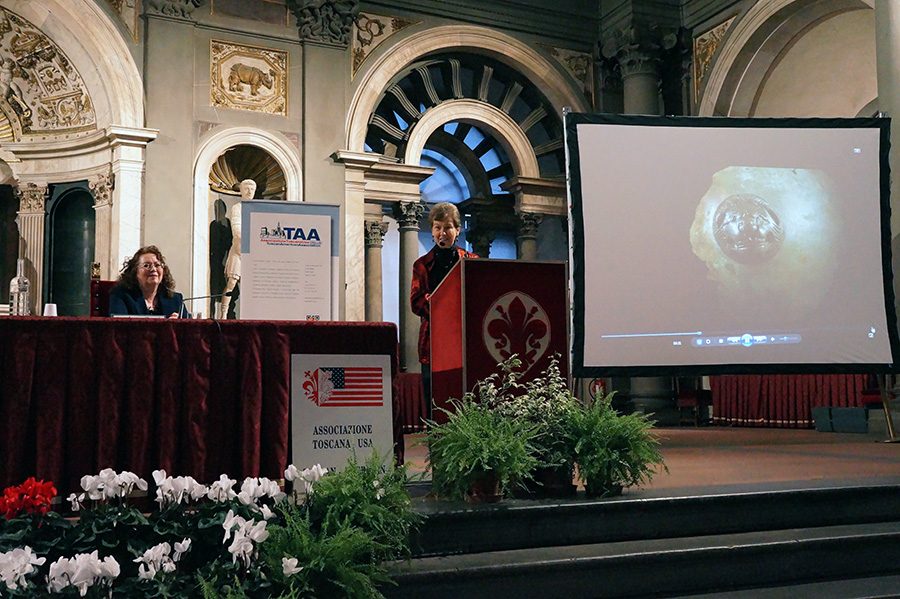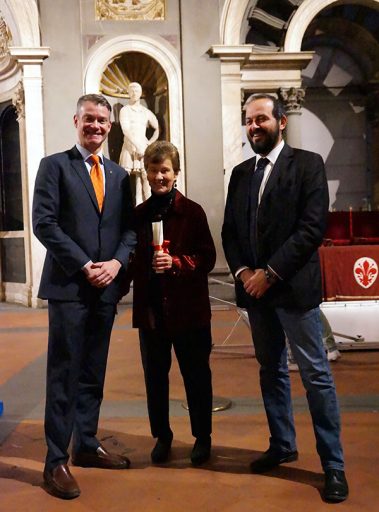
Florida State University classics Professor Nancy de Grummond, one of the world’s leading authorities on the ancient Etruscan civilization, was recently recognized for her decades of archaeological work and research during a ceremony held at the Palazzo Vecchio, the majestic town hall of Florence, Italy.
De Grummond, the M. Lynette Thompson Professor of Classics and a Distinguished Research Professor at FSU, was one of two recipients of a Tuscan American Award, an honor bestowed each year on those who have significantly contributed to further developing the ties of friendship and exchange between the United States and the Tuscany region of central Italy. The other award recipient was Luigi Lazzareschi, CEO of Italian company Sofidel S.p.A., the sixth-largest manufacturer of tissue paper in the world.
The awards were presented during a Welcome Day ceremony hosted by the Tuscan American Association on Oct. 25. The ceremony is held every year for hundreds of American students as they initiate their studies in Florence and Italy in general.
De Grummond, an expert in Etruscan, Hellenistic and Roman archaeology, was recognized by the association for “her work as director of archaeological excavations at Cetamura del Chianti, Tuscany, including research and publications that have contributed to knowledge of the ancient Etruscans and Romans and a field school that has brought hundreds of American students to work and study in Tuscany since she became director in 1983.”
“It was a thrill to have Cetamura recognized in the grand salon of the Palazzo Vecchio, Florence’s historic town hall,” de Grummond said. “It also was a great pleasure to salute the cadre of FSU students who arrived for the fall semester there and who attended the ceremony.”

A major exhibit of artifacts from the Cetamura site was recently mounted at the National Archaeological Museum in Florence. De Grummond has announced that the artifacts will now be transferred to a permanent display in a new museum in Gaiole in Chianti, one of the three original towns of historic Chianti, located very near the Cetamura site.
In their time — which was roughly between 1000 and 100 B.C.E. (“Before the Common Era”) — the Etruscans were the most prominent civilization in Italy, controlling virtually the entire peninsula. They constructed roads, buildings and sewer systems and, along with the ancient Greeks, developed the first true cities in Europe. They also built large, complex religious sanctuaries, which may have been the purpose served, in part, by the Cetamura site.
The Tuscan American Award is the most recent of a number of honors that de Grummond has received over the course of a distinguished career. In 2015, she was selected by the Archaeological Institute of America for its annual Excellence in Undergraduate Teaching Award in recognition of the invaluable service she has given to the archaeological community as an educator. In 2008, she was named a Distinguished Research Professor at FSU, an award that normally goes to researchers in the sciences, and she is a three-time recipient of a FSU’s Teaching Award.
In addition, de Grummond received the inaugural Excellence in Teaching Award in 2010 from the university’s Phi Beta Kappa chapter, which is the Alpha Chapter of Florida.
“Professor de Grummond has had an amazing career at Florida State University and with International Programs,” said Jim Pitts, who oversees FSU’s study-abroad programs. “She has had a significant impact on many students who have participated on her digs at Cetamura. I was very impressed with her exhibit in Florence, and she has been an exceptional ambassador for the University in Florence and throughout the Tuscany region. The Tuscan American Award is richly deserved.”




